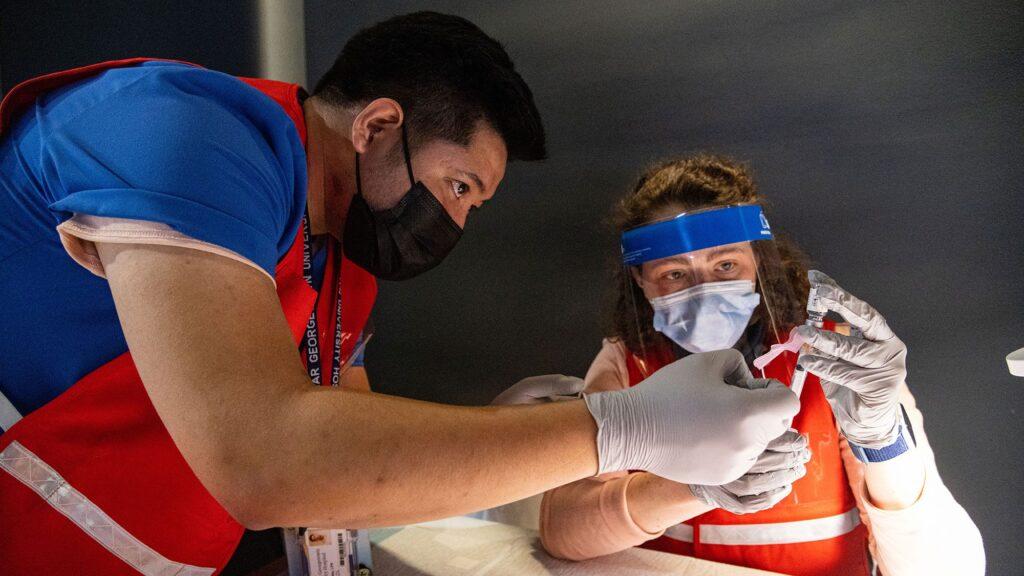Georgetown University is updating its public health guidelines for the Spring 2023 semester after a significant rise in respiratory infections around the country, including COVID-19, Respiratory Syncytial Virus (RSV) and influenza (flu).
The new guidelines reinforce existing protocols such as contact tracing, wastewater testing, and recommending students obtain COVID-19 and flu vaccines. With the start of the Spring semester, Georgetown also transitioned from nasal swab testing to saliva testing offered at vending machines throughout campus.

Georgetown Chief Public Health Officer Ranit Mishori said the university is prepared for an expected rise in COVID-19 cases on campus at the start of the semester.
“The virus has been unpredictable at times and the emergence of new variants – especially variants that may be more virulent or transmissible – is something we are watching closely and will have to adapt to,” Mishori wrote to The Hoya.
To protect against COVID-19 the university has required all students to be fully vaccinated against COVID-19, with 98% of students being fully vaccinated, according to Mishori. Additionally, the university has updated HVAC systems and will continue to offer free masks and testing to the campus community, Mishori said.
The university will continue to monitor public health conditions on campus using wastewater surveillance testing, Mishori said. According to Mishori, wastewater surveillance testing is an unobtrusive method of gauging population-health level that many universities and state and local governments are utilizing across the country.
“Wastewater testing is a science-based method for detecting COVID-19 levels in our community through the sewage system,” Mishori wrote. “People who are infected with the virus that causes COVID-19 shed viral material through their feces, even before they have symptoms (which for many people is the first trigger to test), so wastewater testing can serve as an early warning signal of rising levels and allow us to more rapidly take public health measures in case of an outbreak.”
Recently the university began offering PCR testing through Shield T3 vending machines across campus. Previously the university provided nasal swab PCR testing, with appointments made available using the healthcare app One Medical.
Mishori said the new testing system will continue to be effective in providing PCR testing on campus, while allowing the university to return functionality in locations that may have been previously used as COVID-19 testing facilities.
“This new system will provide our community with greater flexibility regarding when and where to test and enable the campus locations that were converted to clinical COVID-19 testing to become available again for other events and activities,” Mishori wrote.
Locations that were previously dedicated to COVID-19 swab testing include the Leavey Center Ballroom and the Healey Family Student Center, which are now back in regular use.
Margaret Baker, an associate professor of global health at Georgetown, said test rates will need to be monitored in order to understand how students react to the change in the use of vending machines from appointments.
“The change is that the sample is now saliva (versus the nasal swabs of before) and they are being collected through the vending machines,” Baker wrote to The Hoya. “This brings us to something else that is always at the core of public health — human behavior. Just because something is a good idea (evidence based even) does not mean people will do it.”
Prior to the start of the Spring semester Georgetown strongly recommended that students get tested for COVID-19 before their arrival to campus. The guidance also recommends students continue to report positive test results from antigen and off-campus PCR tests to the university.
The recent guidance also mentions concerns raised from contact tracing in the Fall, which showed that many community members would continue to go to classes or work even when experiencing COVID-19 symptoms. The university urges those experiencing any symptoms of illness to stay home and seek medical care if needed.
In addition to the required COVID-19 vaccination, the new guidance strongly recommends students receive their flu vaccine, as well as a bivalent booster for the COVID-19 vaccine when eligible.
Assistant professor of global health Eva Jarawan said respiratory diseases are prominent at this time of year, and preventions including vaccines are necessary to maintain individual and public health.
“It’s not only COVID,” Jarawan wrote to The Hoya. “Respiratory diseases are quite prevalent in winter months and masks as well as frequent handwashing are important to minimize the risks of catching the viruses.”
Baker said she is confident in the university’s recent public health guidelines.
“I am very supportive of the approach that Georgetown University has taken to the COVID pandemic throughout its course,” Baker wrote. “It has adapted to different stages of the pandemic showing that it can both reduce restrictions and increase them again as COVID prevalence increases and decreases.”








